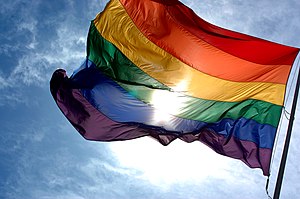I came out to myself and my best friend at the time on Monday, 1 April 1996. Today, 1 April 2011 marks the fifteenth anniversary of that event. In honor of that, I’ve decided to do a series of posts on the topic. This is the second one.
As I said in my
previous post, the night I came out to Merion in that little alcove was the beginning of a new journey to self-acceptance and personal discovery. However, the start of that journey meant the end of a different, darker journey. The journey that ended that night, the journey towards “freedom from unwanted same-sex attractions,” was a painful and self-destructive one and one I’m glad I left behind. And yet, this anniversary would not be complete without talking about it at least a little.
Truth be told, I can’t cover that journey — which lasted for roughly eight years — in a single blog post. I hope to restart
A Journey to Queerdom soon, and I will explore it more fully there. For this post, I hope to tell just enough to capture a glimpse of the emotional chaos that overshadowed me as I came to that fateful April Fool’s Day night.
At the end of my sophomore year in college, I had finally admitted that my feelings for other guys was more than “just a phase.” It was a very real part of my psychological makeup and it was there to stay unless I took some drastic measures. So I started trying to turn myself straight. Granted, I didn’t go to any sort of therapy or ex-gay ministry — fortunately, I wouldn’t have known where to find such help in Selinsgrove of the surrounding area. So instead, I simply tried to go through the process of praying for healing on my own and asking friends I could trust to also pray for me.*
Asking for friends’ help actually created a cycle of increasing frustration. I would admit my “struggle” to each of them separately — a frightening prospect in itself each time, as I was never sure how they might react to the experience and there’s a lot of shame in admitting you like members of your own sex in evangelical and fundamentalist circles, even if you make it clear that you don’t want them. They’d pray with me and for me, and I’d feel better. I’d get an emotional boost and would feel like I could take on the world.
But the emotional high would eventually wear off while the feelings of attraction would persist. My frustrations and sense of shame over feeling the way I felt would return, often magnified by the sense of added failure that somehow I had lost forfeited the “spiritual help” I had gotten and failed yet again. So I’d decide that I needed more help, and that meant telling another friend and seeking further support and help. And there, the cycle would begin all over.
The thing is, dealing with one’s feelings is ultimately something one has to do alone. No one can feel those feelings for you. No one can take them away from you. No one can do anything other than support you through it all, and no one can give that support 24/7. I found that late at night, laying in my bed, I was left all alone to either face my desire for love and intimacy with another man alone or repress it alone. It was my burden to carry, and the more I fought it, the heavier that burden got.
One of the things that drove me to the breaking point on Saturday night, 30 March 1996** was the fact that my loneliness was driven home when my closest friends and my biggest supporters all ended up spending that night with their respective female love interests. I realized that night that this really was my burden to carry, because when push comes to shove, they got to go to their God- and church-approved girlfriends (or potential girlfriends) and find some degree of intimacy and the promise of full intimacy sometime down the road. That realization, and their unintentional acts of rubbing it in my face, pushed me into a full tailspin that night. I spent over half an hour considering and even planning to end my own life.
I’m not going to describe that night. I think I’ve described it well enough
elsewhere. But what I will say is that in that night, I wanted to die because I realized that I could never “beat” my sexual feelings and romantic desires. There was no going straight for me. I had tried and failed. If I continued down that path, the only thing waiting for me was depression, loneliness, and shame. And I couldn’t face that path. If that path was my only choice, I knew it would be better to end my life. So I seriously contemplated it.
And at some point, that realization horrified me. So two nights later, I chose to walk another path.
—
* Given the number of ex-gays who talk about going to therapy, support groups, or even residency programs, I felt out of place at first. I was quite relieved when I discovered that the
bXg community had an entire group for people who went through self-guided attempts at becoming ex-gay.
** I’ve searched every aspect of my memory, and everything convinces me that the truly terrifying dark night was two nights before I came out on April Fool’s Day. Curiously, this means I surived in some sort of in-between state for a full day on Sunday. I have no idea what that day was like or how I managed to survive and not find myself with the same dark thoughts that night as I had entertained the night before.




